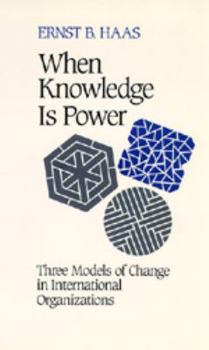When Knowledge Is Power: Three Models of Change in International Organizations
(Part of the Studies in International Political Economy Series)
Select Format
Select Condition 
Book Overview
Do governments seeking to collaborate in such international organizations as the United Nations and the World Bank ever learn to improve the performance of those organizations? Can international... This description may be from another edition of this product.
Format:Paperback
Language:English
ISBN:0520074025
ISBN13:9780520074026
Release Date:April 1991
Publisher:University of California Press
Length:278 Pages
Weight:1.00 lbs.
Dimensions:0.8" x 6.0" x 9.0"
Customer Reviews
1 rating
difficult to change
Published by Thriftbooks.com User , 15 years ago
The book is a testament to how difficult it can be to change a large international organisation. The focus is on the United Nations and the World Bank. For the UN, there is an analysis of its child agencies like WHO. The author gives a sociological perspective on the civil servants who typically staff these organisations. More to the point, these are public organisations, dominated by political groups from numerous nations. The heterogenous nature of the nations is reflected in the diversity of the workforce and in its aims. He considers these to be ideologies, often conflicting, as during the Cold War. Apart from the superpower rivalries, there was also tension between developed and developing nations. Which added to the difficulty of management. What the book did not address was the issues of inefficiencies in staffing, and a possibility of corruption in some agencies. All aided by conflicting societal mores. Change can happen, but often slowly in these organisations.






